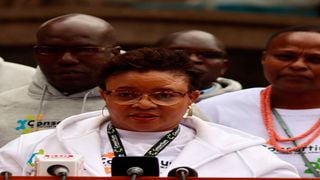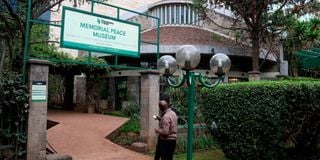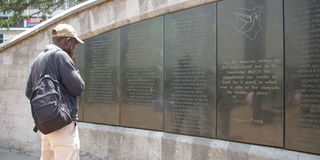
Consortium of the August 7, 1998 Victims Association International Convener, Caroline Muthoka, addresses the press in Nairobi on August 2. The twin bombings in Nairobi and Dar es Salaam killed more than 220 people, a majority being in Kenya.
| Bonface Bogita | Nation Media GroupNews
Premium
Senators push for 1998 blast compensation amid claims majority of victims will not get anything
What you need to know:
- Most American victims and Nairobi embassy staff have received money from the US government.
- Monday will be the 25th anniversary of the attack that left more than 200 people dead in Nairobi, with around 5,000 injured.
- A majority of the estimated 5,000 people injured in the twin bombings of August 7, 1998 will not get anything.
- In the run-up to the August 2022 polls, Kenya Kwanza presidential candidate William Ruto and Azimio opponent Raila Odinga said they would push for compensation if elected.
Around 10.30am on August 7, 1998, a car bomb exploded in the rear parking lot of the United States embassy in Nairobi.
The world on Monday marks the 25th anniversary of the attack that left more than 200 people dead in Nairobi, with around 5,000 injured.
Kenyans bore the worst brunt of the terrorist attack, which resulted in 12 American deaths.
After almost two decades of search for justice, the US government announced compensation for American victims at the time of the attack and those naturalised later.
The deal followed Sudan agreeing to pay $335 million (Sh36 billion) as compensation for victims of past attacks against American targets after being adversely mentioned as having aided the 1998 Nairobi and Dar es Salaam al-Qaeda attacks.
The US government would later add $150 million (Sh21.2 billion) in payouts to the victims of Nairobi and Dar es Salaam bombings. The twin attacks claimed 224 lives.
Every American victim or family of the US embassy attacks was to receive $3 million (Sh322 million), while local staff got $400,000 (Sh43 million).
Eighty five survivors or families of victims will be compensated.
But the agreement only covers compensation to families of US dead and injured or embassy staff.
A majority of the estimated 5,000 people injured in the twin bombings of August 7, 1998 will not get anything.
Neither will families of the more than 200 locals who died in the blast.
Senators have now revived the push for the US to compensate Kenyan victims.
The Senate has formed a nine-member ad-hoc committee to follow up the matter with the US.
The team is chaired by Machakos Senator Agnes Kavindu.
The members are Mr Daniel Maanzo (Makueni), Mr Alexander Mundigi (Embu), Ms Beatrice Ogolla (Nominated), Mr Johnnes Mwaruma (Taita Taveta), Mr Mohamed Chute (Marsabit), Mr Jackson Mandago (Uasin Gishu), Mr William Cheptumo (Baringo), and Ms Peris Tobiko (Nominated).
Survivors and relatives of the Kenyan victims appeared before Senate committee on Friday.
They narrated harrowing stories of the events of the day and how their lives took a turn for the worst.
The explosion left behind widows, widowers, orphans and distraught families.
The survivors’ permanent scars were easily visible as they appeared before senators.
Some are now blind, others using wheelchairs and almost all of them on medication for the remaining part of their lives.
Ms Grace Njoroge, who was orphaned by the explosion that morning, told the lawmakers that her father was mutilated by the blast and that the family took long to identify the body.
Ms Njoroge is one of the more than 100 August 7, 1998 bomb orphans.
The renewed focus on the terrorist attack and its aftermath comes as lawyers for the victims begin lobbying American lawmakers to amend a congressionally established terrorism compensation fund and make Kenyan victims and their families eligible.
Margaret Achieng Jow Prays during the 20th anniversary of the August 7, 1998 bombing of the US Embassy in Nairobi, at the August 7th Memorial Park in Nairobi on August 7, 2018.
Committee members will meet a team from US next month before visiting their American colleagues to rally them to amend their laws to include Kenyan victims.
The senators will then table their report in the House in September.
If the proposed changes go through, some 1,000 to 3,000 Kenyan victims could be eligible for $5 million each, with the total payout being $5 billion to $15 billion.
In January 2008, the US extended the reach of the exclusions under the Foreign Sovereign Immunity Act (FSIA) to include private action suits on behalf of non-Americans if the victim was an employee of the US government at the time of the deadly attack.
The Senate wants the committee chaired by Ms Kavindu – the originator of the compensation motion – to engage the Ministry of Foreign and Diaspora Affairs reach out to the US government to pursue and accomplish the compensation of Kenyan victims and their families.

Memorial Peace Museum at the August 7 Memorial Park on the Moi-Haile Sellasie Avenue roundabout in Nairobi on August 3.
This is to be by exploring the eligibility of Kenyan victims and their representatives, surviving spouses and next of kin in the Victim Compensation Fund.
Ms Kavindu said though the US government has compensated some victims and families of Americans, Kenyans and other nationalities have never received a cent.
“US allies, including Kenya, have endured the great burden of death and long-term and in many instances permanent, physical and psychological injuries,” Senator Kavindu said.
Senator Maanzo said the attack was on the American government and that Kenyans were collateral damage.
He added that it is only fair for the US government to come up with a fund to compensate all the victims, irrespective of where they come from.
He said once passed, the Victim Compensation Fund would serve Kenya and other countries which have been attacked, with Americans being the target.
“With this committee that has been set up, we will push for the quick actualisation of the fund to ensure Kenyan victims and their families are compensated,” Mr Maanzo said.
In May 2021, victims of the bombing sought a court order to compel Kenya’s Attorney-General pursue compensation from top French bank, BNP Paribas, and Sudan.
The victims, through Katiba Institute, petitioned the High Court to order the Kenyan government to seek compensation from the French bank and Sudan within six months.
They tie their suit to the bank’s admission in an American court of violating economic sanctions against Khartoum, which was accused of harbouring al-Qaeda leader Osama bin Laden and other members of the terrorist organisation in the 1990s.
They cited a US court finding that without Sudan’s support, al-Qaeda could not have perpetrated the deadly embassy bombings in the Kenyan and Tanzanian capitals.

A visitor at the site of the 1998 blast in Nairobi.
Close links between Khartoum and BNP Paribas – which has been accused of operating as the “central bank for the government of Sudan,”– landed the French lender in trouble, forcing it into a $8.9 billion (Sh957 billion) settlement with the American authorities.
In the run-up to the August 2022 elections, Kenya Kwanza presidential candidate and then-Deputy President William Ruto and his Azimio la Umoja One Kenya alliance opponent Raila Odinga said they would push for compensation of the 1998 bombing victims by the US if they were to form the government.
Non-economic losses
Nairobi Senator Edwin Sifuna said a lot of efforts have been directed towards getting justice for the victims of the bombing “but nothing appears to be happening”.
He urged the committee to ensure justice for the people affected in the tragedy.
“It is a national shame that we have not pursued justice for the helpless victims,” Senator Sifuna said.
“There has been compensation for others by the US government. Twenty five years is a very long time for people to wait for justice.”
Busia Senator Okiya Okoiti Omtatah said the US came up with the Embassy Employee Compensation Act to take care of the victims of the Nairobi and Dar es Salaam bombings.
He added that because of the law, people who end up as victims of terrorist attacks on aircraft or other place get compensated by the government.
Those to be compensated should have suffered physical harm and economic and non-economic losses such as, death and loss of enjoyment of life.
“The standards maintained in that Act are the same standards the US applies when there is a terrorist attack anywhere in the world and their citizens are involved,” Mr Omtatah said.
“Time has come for Kenya to take action and demand that local victims of the 1998 attacks have to be compensated.”
Kiambu Senator, Karungo Thangwa, complained that Kenyan victims of the explosion have been neglected yet Americans were compensated “many years ago”.
He added that Kiambu County alone has 17 victims, including Ms Esther Githangui and Mr Ezekiel Kingo’ri from Kikuyu constituency.
“It is not enough to have your name plastered on a wall somewhere in Nairobi for people to be coming and taking photos when lives were lost,” he said.
Nandi Senator, Samson Cherargei, urged the committee to ensure the US compensates Kenyan victims.
“We are not just talking about money. We are talking about psycho-social support. The lives of the victims and their kin were changed. Many families lost breadwinners, parents, children and friends, who are still traumatised,” Mr Cherargei said.
He added that Kenya should also compensate citizens, saying during the last Parliament, the government committed Sh10 billion for victims of human rights abuses.
“Even as we pursue this matter, the US should not be the only one paying compensation. We also want the Kenyan government to do the same. Victims of the 1998 bombing are a forgotten lot,” the senator added.
The lawmaker said the Fund should be reinstated to compensate other types of rights abuses, including enforced disappearances, extra-judicial killings, post-election violence, internally displaced people and infrastructural evictees.
“I challenge this committee to call for a supplementary budget and push to reinstate the Sh10 billion. This amount was meant to ‘re-right’ and compensate for injustice and human rights abuses in Kenya,” he said.
Nominated Senator Esther Okenyuri said the country should look beyond the 1998 bombing.
“We also need to look at internal cases. There are freedom fighters still fighting for compensation,” Ms Okenyuri said.
TOMORROW: In this series to mark 25 years after the blast, we look at the lessons Kenya has learnt and how that has shaped response and preparedness





